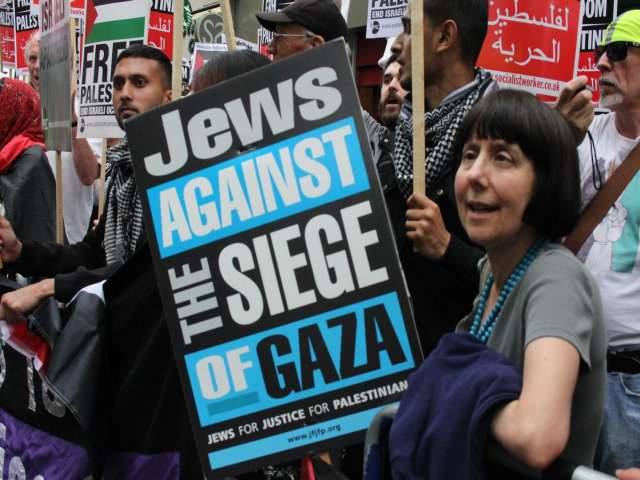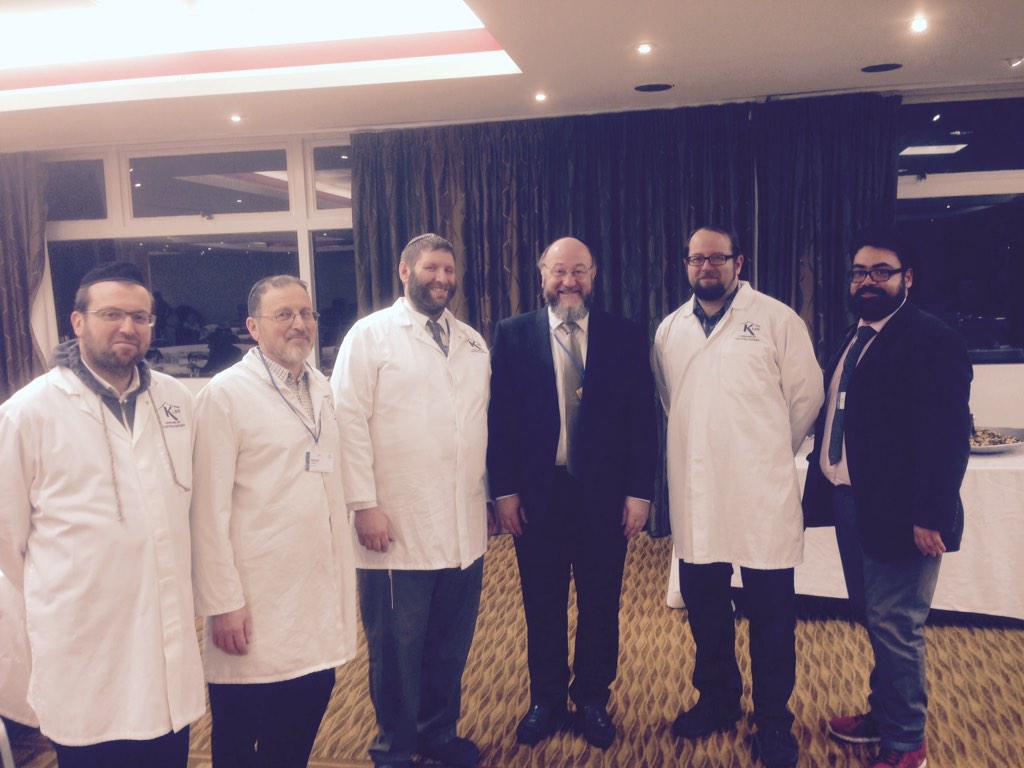Orthodox Jews in UK are just too orthodox

Jewish and proud: the unOrthodox Jews in the July 2014 demonstration for Gaza, London.
UK Jews’ own antisemitism is stifling the community from within
A culture of conformity, submission and resignation is preventing some Brits from wearing their Judaism proudly.
By Sara Hirschhorn, Haaretz
January 22, 2015
My odyssey as a Jew in Britain began at the U.K. border almost a year and a half ago when I moved across the pond to become an assistant professor at Oxford. Landing in the middle of the High Holy Day period, I smiled in solidarity with the large ultra-Orthodox family at passport control at Heathrow airport, but anxious not to get stuck in an interminable queue, slipped into a line behind an elderly Indian couple. It all seemed perfectly multicultural, until I got called up the desk of a guard of Middle Eastern descent.
“Passport please!” he barked to a bewildered traveler who had spent all of three days in the U.K. as an adult before moving across the ocean, where flipping to my newly acquired work visa, he peered at me suspiciously and inquired about my university position. “I’m the new lecturer in Israel Studies at Oxford,” I swallowed, which elicited a grimace — should I have told him Palestine Studies instead? — and a demand to see my university contract. After I nervously produced the file, he glanced over my documents and noted I was arriving several days past my start date in England. “My department allowed me to defer my arrival until after Rosh—, uh, a religious—, I mean, a family gathering,” I finally settled on, which earned me another suspicious look and a loud stamp of my passport: “Welcome to the United Kingdom!”
Audience at the London Limmud conference. Photo by Shirli Kirschner[T]he original British Limmud Conference (now in its 33rd year) is like no other.
The atrocious food, icy rooms, windy pathways and far-flung classrooms make it an endurance test like no other Jewish gathering you will have been to. But the breadth and range of its hundreds upon hundreds of sessions, the near-anarchic informal atmosphere and the sense that just about anything, no matter how scandalous or heretical, can be said, makes the hardships all worthwhile.Anshell Pfeffer in Haaretz
As unscientific and scare-mongering as the recently released Campaign Against Antisemitism in the U.K. report is, some parts of it resonated with me. I too feel the — ambivalence? shame? fear? — of wearing my Jewish identity proudly here; the desire to avoid conversations about religion, the unwelcoming stares when I reuse my conference tote bags with Jewish symbols and Hebrew lettering at the farmers market and the gym, the polite antisemitism of the white upper-middle class in the cushy Cotswolds. While U.K. Jews have struggled valiantly to be “the most British of the British,” their many successes seem counterbalanced by persisting ghettoization and racism. While the topic of antisemitism requires far more sober, rigorous study that the weekly headlines of the Jewish Chronicle blare each week (“Man Dressed as Nazi thrown out of ASDA”), the anecdotal evidence rings true — there is a discomfort in daily life here that was totally alien to my upbringing in America and Israel.
But the truth is that courage has indeed become a rare commodity in large segments of Orthodoxy.
When the new Chief Rabbi, Ephraim Mirvis announced his intention to attend the Limmud conference he invited the ire of Orthodox rabbis, led by former head of Beth Din Dayan Chanoch Ehrentreu. Their letter called on ‘ fellow Jews not to participate in the upcoming Limmud conference in England because spokesmen of the Reform and Conservative movements will also be present, is most telling. It has once again thrown British Jewry into a fierce, highly publicized and embarrassing confrontation’. JPost, August 2013.
Dayan Chanoch Ehrentreu ordains new Orthodox Rabbis at the Synagogue Community Centre in Cologne, Germany, Sept. 13, 2012. Photo by Uri Strauss
Yet, what I’ve come to fear most is not physical attacks or verbal abuse from the British public, but the culture of conformity, submission, and resignation among U.K. Jewry toward intra-communal issues. Rather than horrors like that which occurred in Paris, my experience with the Jewish community here has been haunted by the in-house antisemitism of harbouring ill-will toward other denominations, hating difference, and humiliating those within the community who seek to explore new identities and push boundaries.

Not trembling:some of the many Jews who marched on the Stop the Gaza Massacre demonstration in London, 26th July 2014.
I’m tired of feeling that U.K. Jewry lives its life trembling in fear of Big Brother Beth Din and must bow to its will. Despite the leadership of the office of the Chief Rabbinate (and the persona of Rabbi Ephraim Mirvis) on some matters, it’s too often obsequious to Orthodox forces, while failing to offer moral leadership to all British Jews — including the 51 percent that are women, according to the 2013 Institute for Jewish Policy Research report — instead of only the most observant.
The United Synagogue too seems stymied and sycophantic. Why is it that we still have to skulk around to partnership minyans (prayer quorums) and Limmud like we are teenagers sneaking out of our parents’ house on Friday night? (While these activities are hardly transgressive, some people have suggested the severe consequences to their reputations, economic prospects, and even shidduchim (arranged marriages) for their children of deviating from societal norms.) Why are we bullied and shamed for wanting to explore different Jewish identities and converse with each other about them in open forums?

Chief Rabbi Mirvis meets the Kashrut London Beth Din to check the food at Limmud is kosher. He received letters of protest from some Orthodox rabbis for attending Limmud.
So long as our community lacks the pride and strength to overcome the fear of facing each other within, it will not be able to face the world outside.

August 4th, 2014, British Jews Against Genocide held a ‘die-in’ outside the offices of the Board of Deputies of British Jews in protest at the BoD’s conformity with Israel’s actions.
I find myself wishing that the near-constant refrain of “What will people say?” be transformed into harmonious chorus of “How will we do this differently?” While Jews comprise only 0.5 percent of the population in England and Wales, according to the 2011 census, there is great vibrancy and innovation here — from the social space of JW3, to reinvigorated synagogues and independent havurot (study and prayer groups), and the truly inspirational Limmud U.K. conference. More and more Jews here are “out and proud” of their identities and willing to engage in sincere and thoughtful conversations with those across the religious-political spectrum. Yet, as both individuals and institutions, U.K. Jewry has far to go to end fear and disunity within its ranks. Now is the time to “keep calm and carry on” with intra-communal dialogue. To be secure Jews in the street, the antisemitism must first stop at home.
Dr. Sara Yael Hirschhorn is University Research Lecturer and Sidney Brichto Fellow in Israel Studies at the University of Oxford. Her research, teaching and public engagement activities focus on the Israeli settler movement, the Arab-Israeli conflict and the relationship between U.S. Jewry and Israel. She is the author of the forthcoming City on a Hilltop: American Jews and the Israeli Settler Movement Since 1967 (Harvard University Press). Follow her on Twitter: @SaraHirschhorn1.


